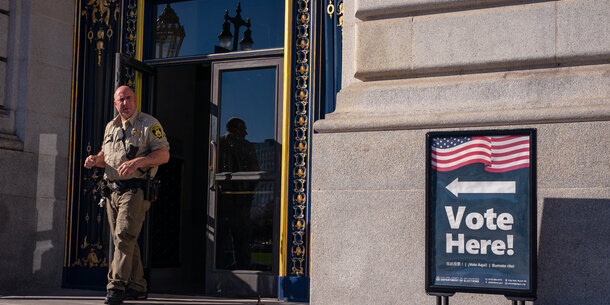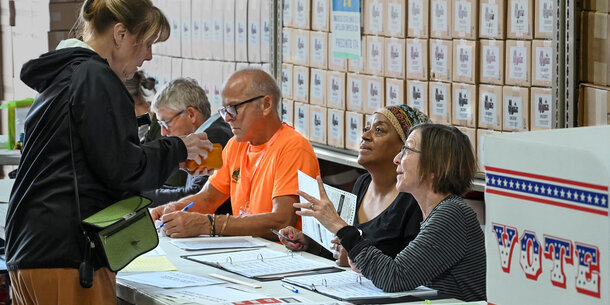Donald Trump was indicted in Georgia state court Monday night, along with 18 of his allies, for attempting to overturn the 2020 presidential election results in the state. Many of the charges for Trump and his codefendants mirror or overlap with the charges that Trump faces in a federal case brought by Special Counsel Jack Smith. But among the new charges is a surprise not hinted at until news outlets began reporting on it last weekend.
Fulton County District Attorney Fani Willis has uncovered evidence that Trump’s team was behind multiple unauthorized breaches of voting systemsin Coffee County, Georgia, in January 2021. According to the indictment, Trump allies, including attorney Sidney Powell, directed a group of campaign contractors to copy data and software from voting machines.
The Georgia breaches are especially significant because they involve people within Trump’s inner circle, but they are not isolated incidents — they are part of a disturbing wave of attacks on election security. Nationwide, there have been at least 17 attempts to gain unauthorized access to voting equipment since the 2020 election, most with connections to Trump allies or other well-known election conspiracy theorists. In eight separate locations in four states, those efforts were successful.
Prosecuting those who undermine the integrity of our election systems — particularly those who do so from high-profile positions of power — is critical to protecting our democracy. It serves notice to all that law enforcement officials are vigilant and prepared to punish wrongdoing.
These breaches inflict profound damage. Election propagandists have used and manipulated this improperly gathered data to spread lies and further their conspiracy theories about the 2020 election. In Michigan, election denier Matt DePerno posted videos of an associate tampering with a piece of voting equipment, spuriously claiming that they had proved how easy it was to make the machine produce manipulated results. (DePerno, who made an unsuccessful run for Michigan attorney general, has since been chargedwith undue possession of a voting machine and conspiracy to gain unauthorized access to a computer or computer system.) In Colorado, speakers at a conference hosted by MyPillow CEO Mike Lindell presented files from the Mesa County election system hard drive. The files didn’t reveal any actual conspiracy, but their presentation did constitute what the secretary of state called a “serious breach of voting system security protocols.” Without context from reliable sources, these widely viewed videos undermine trust in elections.
Beyond propaganda, these breaches directly threaten the integrity of our elections. Those accessing and inspecting the systems may inadvertently damage them, as apparently happened in at least some of the breaches in Michigan. Worse, they could corrupt the equipment with malware or take other actions that might not be detectable. That’s why, when state officials have discovered these unauthorized breaches, they have decertified the relevant systems so that they cannot be used in future elections.
As 2024 approaches, we must strengthen our defenses. State officials should follow best practices for detecting and confirming whether physical breaches have taken place. These include restricting physical and digital access to the most sensitive equipment through the use of video surveillance, access logs, and keycard systems. Where possible, officials should decertify all affected machines when breaches are discovered. Communication is key: publicly explaining the steps taken in response to any unauthorized breaches improves transparency and builds confidence in our elections.
It must also be clear that there is a price to pay for illegally accessing voting systems. Colorado and Minnesota recently updated their laws to more explicitly state that such conduct is illegal. The Justice Department should also issue guidance to make clear that tampering with voting equipment can also violate federal law.
Prosecutors in Michigan and Colorado have indicted multiple individuals connected to unauthorized breaches in those states. In the Georgia indictment, Powell and three others now join the list of those accused of accessing election data without authorization. Whatever the outcome, bringing these cases helps protect and maintain the integrity of our election systems and public confidence in them.



